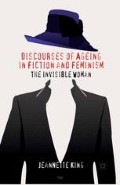Abstract
In my Introduction I suggested that, given the silence regarding ageing in twentieth-century feminist movements, we could perhaps instead find a feminist discourse of ageing in fictional texts such as those discussed in this monograph. One of the most difficult issues such a discourse needs to encompass is that of the relationship between ageing and female identity. What impact does ageing have on that identity? While allowing for the many varieties of feminist viewpoint, one might expect general agreement that any answer to that question would need to avoid both dualistic and essentialist conceptions of female identity, and to recognise the socially constructed nature of both gender and ageing. It would entail an understanding that identity is always embodied, along with the recognition that the meaning of that embodiment is determined by currently circulating cultural discourses. Situated at the intersection of bodily experience and discourse, such an identity would therefore combine an awareness of the changing body with a consciousness of the discursive constraints imposed upon it by the prevailing culture. With regard to gender, Judith Butler’s concept of performativity suggests that it is simply the reiterative practice of regulatory norms that produces and stabilises the embodied identity they name.1 That is, I do not behave in a certain way because I am a woman; it is because I behave in a certain way that I constitute myself as ‘woman’.
Access this chapter
Tax calculation will be finalised at checkout
Purchases are for personal use only
Preview
Unable to display preview. Download preview PDF.
Notes
Judith Butler, Gender Trouble: Feminism and the Subversion of Identity (Routledge, 1990), xv–xvi. Joanne Trevenna, however, makes a persuasive case for querying the emphasis placed on the affiliation between Carter and Butler. See ‘Gender as performance: questioning the ‘Butlerification’ of Angela Carter’s fiction’, Journal of Gender Studies, 11 (2002), 267–76.
Pam Morris, ‘Women’s writing: an ambivalent politics’, in Exploring Bakhtin, ed. Alastair Renfrew and Andrew Roberts (Glasgow: Strathclyde University Press, 1997), pp. 57–74 (p. 58).
Interview with Lorna Sage, in New Writing, ed. Malcolm Bradbury and Judith Cooke (Minerva, 1992), pp. 185–93 (p. 189).
Jenny Uglow (ed.), Shaking a Leg: Journalism and Writings: Angela Carter (Chatto and Windus, 1997), p. xiv.
See, for example, Aidan Day, Angela Carter: The Rational Glass (Manchester University Press, 1998).
Kate Millett, Sexual Politics (Virago, 1977), pp. 24–5.
Angela Carter, The Sadeian Woman: An Exercise in Cultural History (Virago, 1979), p. 6.
Pam Morris, Literature and Feminism (Oxford: Blackwell, 1993), p. 60.
Linden Peach, Angela Carter (Basingstoke: Macmillan, 1998), p. 132.
Angela Carter, Wise Children (Vintage, 1992), p. 2. All further page references to this novel will follow the relevant quotation in the text.
Kathleen Woodward, ‘Performing age, performing gender’, NWSA Journal, 18 (2006), 162–89 (pp. 167, 163).
Sarah Gamble, Angela Carter: Writing from the Front Line (Edinburgh University Press, 1997), p. 173.
Angela Carter, ‘In Pantoland’, American Ghosts and Old World Wonders (Chatto and Windus, 1993), p. 109.
Kathleen Woodward, Figuring Age: Women, Bodies, Generations (Bloomington: University of Indiana, 1999), p. 160.
Kathleen Woodward, Ageing and Its Discontents: Freud and Other Fictions (Bloomington: University of Indiana, 1991), pp. 12–13.
Rosemary Betterton, ‘Louise Bourgeois, ageing, and maternal bodies’, Feminist Review, 93 (2009), 27–45.
Beth A. Boehm, ‘Wise Children: Angela Carter’s swan song’, The Review of Contemporary Fiction, 14 (1994), 84–9 (p. 88).
Sarah Gamble, Angela Carter: A Literary Life (Basingstoke: Palgrave Macmillan, 2006), p. 191.
Lorna Sage, Angela Carter (Plymouth: Northcote House, 1994), p. 58.
Author information
Authors and Affiliations
Copyright information
© 2013 Jeannette King
About this chapter
Cite this chapter
King, J. (2013). Conclusion: Shaking a Leg at Age. In: Discourses of Ageing in Fiction and Feminism. Palgrave Macmillan, London. https://doi.org/10.1057/9781137292278_9
Download citation
DOI: https://doi.org/10.1057/9781137292278_9
Publisher Name: Palgrave Macmillan, London
Print ISBN: 978-1-349-33476-6
Online ISBN: 978-1-137-29227-8
eBook Packages: Palgrave Literature CollectionLiterature, Cultural and Media Studies (R0)

